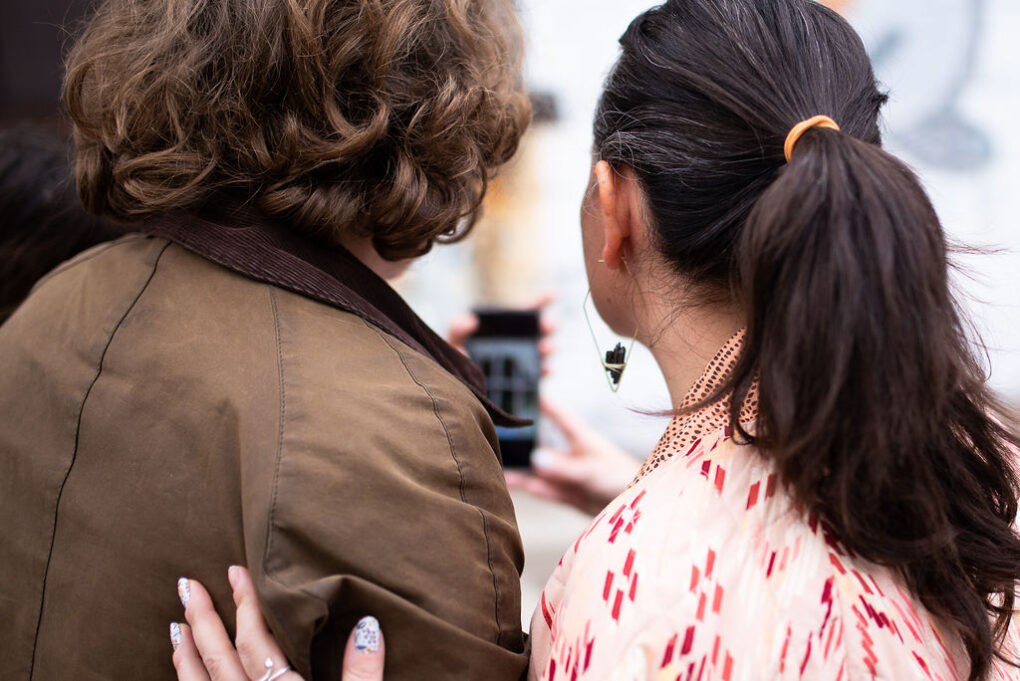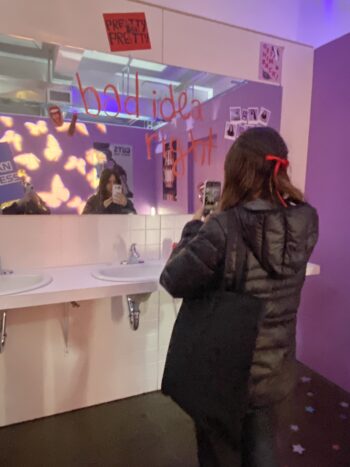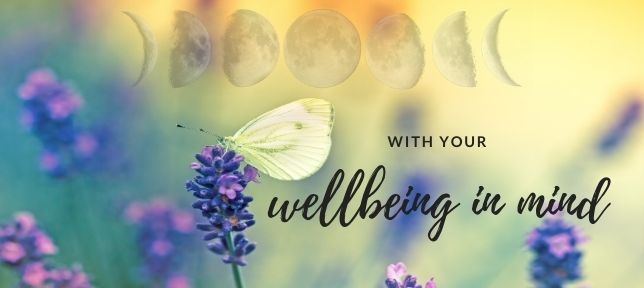My children are not young school-agers anymore. With that comes new ways to care for them, as well as the balance of joys and problems that come with this developmental age. And yet, this is the stage of life that i know well – i studied human development and specifically adolescent psychology in my undergrad and was a youth shelter worker in the beginning period of my career. In fact, one of my favourite jobs was going to middle and high school classes to talk to students about healthy relationships, puberty and self-esteem.
My kids may have a different idea about me doing this with them though.
I also remember my own pre-teen and teen years more than my childhood.
 My eldest is adjusting to high school. I spoke about this Rite of Passage before. With all its curve balls and adjustments to embrace, one thing continues to be evident: They come to me to talk about the stuff that i deem important and know something about. I may not be good at math or science homework, but i am so here for chats about friendships and heartbreak.
My eldest is adjusting to high school. I spoke about this Rite of Passage before. With all its curve balls and adjustments to embrace, one thing continues to be evident: They come to me to talk about the stuff that i deem important and know something about. I may not be good at math or science homework, but i am so here for chats about friendships and heartbreak.
Here’s another example of a work-in-progress: I recently learned about some very upsetting incidents at my daughter’s school. Boys in her middle school said intentionally provocative and violent things about their female classmates. My daughter shared only part of the story with me, and kept out the main concern – the gender-based violence that these words represented. Of course, i quickly found out because our small school is a village and the news was passed around. I’m so grateful for this.
It has prompted me to be more intentional with how i address the things that are important to me as a mom.
When i was talking to my kid about this incident, she shared that she was uncomfortable because the topic (with her parents specifically) was ‘cringy.’ She assumed that i also felt this way when i was a 12-year old having these talks with my own parents. Little did she know that i desperately needed and wanted these talks. I did not get to have these conversations at all, and was alone to carry the feelings and confusion, let alone the decision about what to do about the hard things i lived through as a teen.
And i had more than my fair share of hard things.
Out of the talk i had with her, as well as ones i have shared with other mothers in our community, i realized i have something to offer our community: a circle for our children and us together.
I have found my magic as a mother: I can talk about things like puberty, healthy realtionships, and hard emotions and also WANT TO, and i can offer a community gathering (aka Circle) and build a container for this topic, and more like it. I even have a name for it – Seed and Snake. I’ll leave the explanation of this for another time.
I wholeheartedly believe we all need a village to care for each other. I love the reciprocity of support and guidance we can give each other. I am so ready to shift away from an individualistic care model, and one that sees village aunties and wise elders as the valuable members they are. Of course, i also see that no one is going to care for my children like I do. They won’t have my kids’ best interests in mind: rather they will have their own core values and instincts at the forefront of their support. Being at the centre of my children’s needs is my maternal, feminine responsibility and mine alone. My partner, their father, also has his own gentle masculine way to guide them.
This is the balance of finding a new way – an old way in fact – that is post-colonialist, and not patriarchal. It is the both/and of feminine flow and seeing we are stronger in community, versus taught to believe we are vulnerable and weak when asking for support.
Motherhood unveils our mortality. It reveals our inability to control everything. It is as much tethered to grief as it is the experiences of joy and love. It is the practice of loving so much and the inevitable letting go.
Any Dally shared these powerful words: “There have always been mothers, but motherhood was invented.” What does she mean by this? She goes on to say: “Each subsequent age and society has defined it in its own terms and imposed its own restrictions and expectations on mothers. Thus motherhood has not always seemed or been the same.” She wrote this in 1982, in her book Inventing Motherhood.
When we see that motherhood is a social construct, it creates space for us to become empowered and have agency to transform how we experience being a mother. Sophie Brock, a sociologist who specializes in matrescence today shares that “this understanding unlocks our power in redefining ourselves, reclaiming our experience, and moving towards revolutionising motherhood – for us and future generations.”
It’s also important to note who are mothers, be it via birth or adoption, and not all folks who birth their child identify as mothers. Not everyone who cares for their child in a maternal way is a mother. And at the same time, mothering is a verb that characterizes the act of caretaking with compassion and presence. This is part of the social construct.
Matricentric Feminism is a theory within feminism that centres mothers’ experiences. Coined by the feminist scholar Andrea O’Reilly, it intentionally looks at the context and challenges of mothers today. She claims that motherhood is the ‘unfinished business’ of feminism. While i do not totally agree, i understand her view. As more and more research and discussions are being held about matrescence, maternal load, and maternal mental health now, we are seeing a boost in the role and identity that the term ‘mother’ is tethered to. So, it’s important to look at the psychological, socio-cultural, economic, and political pillars that impact this identity. Having an active voice and reminder of the experience and plight of mothers is essential because it is us who have to keep cleaning all the finger-prints of our children and patriarchy alike off the glass ceiling. The ceiling may be higher and we have some more room, but it is still nonetheless present – and as oppressive as ever.
At the root of matricentric feminism is this reclamation – that being a mother is a powerful role to have. It is in fact the predominant role of all life – creating, giving birth to, and raising humans. It is about embracing a maternal energy, regardless of our gender. This is not easy to do in a society that still clings onto a patriarchal worldview. We are given a load to carry through the matrilineal burden of mothering – a verb now versus an identity alone, and yet being a mother is a role that is undervalued.
Understanding the social construct of motherhood “allows us to embrace and acknowledge the deep personal growth that can come from becoming a mother, coming to know ourselves in a completely new way, stepping into our power and experiencing fierce love and transformation. This understanding unlocks our power in redefining ourselves, reclaiming our experience, and moving towards revolutionizing motherhood – for us and future generations.” Sophie Brock
Here is the glass ceiling showing up again: We will never be good enough when judged according to the standards of the perfect mother, because we were never MEANT to be. This is impossible: The dial keeps changing, the room feels more spacious. That has been the biggest magic trick of all. “The problem is NOT with mothers not being good enough, not doing enough or not juggling well enough. The problem is the way the ‘tank’ of patriarchal Motherhood has been constructed and the rules that are written on it.” Sophie Brock
When i started to see how i was internalizing patriarchal mothering, i was first surprised that i could succumb to this. As a feminist myself, i understood the mom shame and guilt i carried was not mine. It was not my mother’s hand-me-downs either but something i definitely inherited. So i did something about it. Little by little, i have been taking off these emperor’s clothes that never fit me, and instead putting on my favourite magical cloak of feminist mother.
 It’s been a healing, messy, and reparative process. It’s like i’m learning new magic tricks, ones that have been hidden in the dusty books at the used bookstore.
It’s been a healing, messy, and reparative process. It’s like i’m learning new magic tricks, ones that have been hidden in the dusty books at the used bookstore.
For instance, I took my kid to her first music concert earlier this year. It was a pretty reparative experience for me. My own parents not only struggled to ask about my interests, let alone embrace and encourage them. My mom had a much better sense of what i liked than my dad, and yet there was no way i could ask them to take me to a concert or the event of last year, the Eras tour Taylor swift movie.
I don’t want to be my children’s friend. I want to honour the relationship we have. In fact, having a hierarchy is okay – more than okay. We are our children’s teachers and elder (or at least we should aspire to be). We are not equal. That doesn’t mean i can’t also be a part of my child’s life, and let them know that what happens to them matters to me; what matters to them matters to me as well.
When i was a new mom, i needed others with shared values and rhythms. A pregnant person needs others to protect us who are NOT in early parenthood too – it’s a circle of life after all. What i now understand is that we also need to not feel guilty when we enter a different stage of life. I will always be a mother but i don’t have to solely mother in my daily life.
Of course, i am still a mother and identify with my role of Mother. Now that my children are older, though, i get to find this balance of life everyone talks about like it’s a treasure.
Let us not take it for granted that we can heal our mother wounds and be cycle breakers. We can be the mother or parent our children need, and also be a mother to ourselves, our community, and be a voice for change. Being maternal is for any gender to access.
Let us birth a new way.

